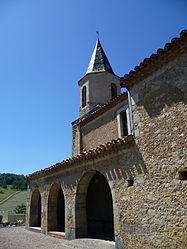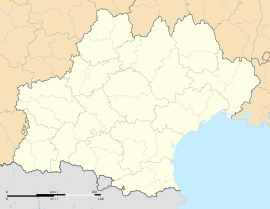You can help expand this article with text translated from the corresponding article in French. (December 2008) Click [show] for important translation instructions.
|
Montesquieu-Avantès (French pronunciation: [mɔ̃tɛskjø avɑ̃tɛs]) is a commune in the Ariège department in southwestern France.
Montesquieu-Avantès | |
|---|---|
 The church in Montesquieu-Avantès | |
| Coordinates: 43°01′28″N 1°11′51″E / 43.0244°N 1.1975°E | |
| Country | France |
| Region | Occitania |
| Department | Ariège |
| Arrondissement | Saint-Girons |
| Canton | Portes du Couserans |
| Government | |
| • Mayor (2020–2026) | Jocelyne Fert[1] |
Area 1 | 16.52 km2 (6.38 sq mi) |
| Population (2021)[2] | 257 |
| • Density | 16/km2 (40/sq mi) |
| Time zone | UTC+01:00 (CET) |
| • Summer (DST) | UTC+02:00 (CEST) |
| INSEE/Postal code | 09204 /09200 |
| Elevation | 430–690 m (1,410–2,260 ft) (avg. 470 m or 1,540 ft) |
| 1 French Land Register data, which excludes lakes, ponds, glaciers > 1 km2 (0.386 sq mi or 247 acres) and river estuaries. | |
History
editMontesquieu-Avantès has a significant prehistory in the Pyrenees. The cave-complex was carved out by the Volp River resulting in three extensive caverns: Enlène Cave, Trois-Frères and Tuc d'Audoubert.[3] They were discovered by the Begouën children on 10 October 1912.[4]
The caves contain unique works of art. The Salle des Bisons features two masterfully modelled bison, which were sculpted in clay with a stone spatula-like tool 17,000 years ago and show the imprint of the artist's fingers. The pair are among the largest and finest surviving prehistoric sculptures.[5]
Occupied in the Upper Palaeolithic, notably during the Magdalenian Epoch, the caves have been extensively studied. These works on Tuc d'Audoubert were compiled in 2009 in a monograph entitled "The Secret Sanctuary of the Bison". A subsequent book entitled "The Cave of the Three Brothers" ("La Caverne des Trois-Frères")[6] documents a century of research. It was published in 2014 on the centenary of its discovery, on 20 July 1914.
These extremely fragile caves are closed to the public for the purposes of preservation.
Montesquieu was a country house founded in 1272 on the initiative of the Comte de Comminges Bernard VI.
Population
edit| Year | Pop. | ±% p.a. |
|---|---|---|
| 1968 | 323 | — |
| 1975 | 265 | −2.79% |
| 1982 | 280 | +0.79% |
| 1990 | 270 | −0.45% |
| 1999 | 240 | −1.30% |
| 2009 | 244 | +0.17% |
| 2014 | 252 | +0.65% |
| 2020 | 253 | +0.07% |
| Source: INSEE[7] | ||
See also
editReferences
edit- ^ "Répertoire national des élus: les maires". data.gouv.fr, Plateforme ouverte des données publiques françaises (in French). 9 August 2021.
- ^ "Populations légales 2021" (in French). The National Institute of Statistics and Economic Studies. 28 December 2023.
- ^ Association Louis Begouën. "Cavernes du Volp" (in French).
- ^ "Centenaire de la découverte de la grotte du Tuc d'Audoubert (Ariège) et de ses " bisons d'argile "" (PDF). International Newsletter on Rock Art (INORA) (in French) (65). 2013. ISSN 1022-3282. Retrieved 31 March 2019..
- ^ Kleiner, Fred (2009). Gardner's Art through the Ages: The Western Perspective. Vol. 1. p. 36. ISBN 978-0495573609.
- ^ Begouën, Robert; Clottes, Jean; Feruglio, Valérie; Pastoors, Andreas; Lacombe, Sébastien; Hansen, Jörg; Berke, Hubert; Lumley (de), Henry (2014). Association Louis Bégouën (ed.). La caverne des Trois-Frères : anthologie d'un exceptionnel sanctuaire préhistorique (in French). 248 p. Retrieved 31 March 2019..
- ^ Population en historique depuis 1968, INSEE


